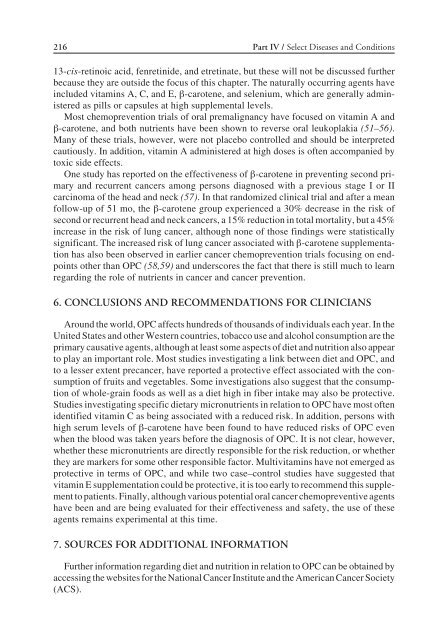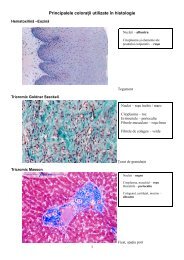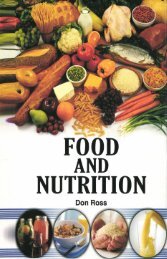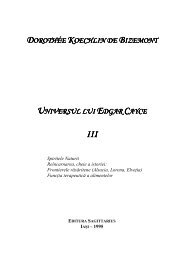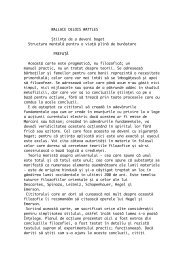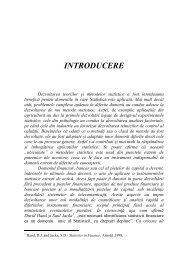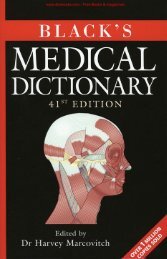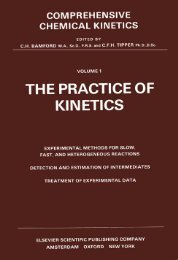- Page 1 and 2:
NutritionandOral MedicineEdited byR
- Page 3 and 4:
NUTRITION AND HEALTHAdrianne Bend
- Page 5 and 6:
© 2005 Humana Press Inc.999 Riverv
- Page 8 and 9:
Series Editor’s IntroductionThe N
- Page 11 and 12:
xSeries Editor’s Introductioning
- Page 13 and 14:
xiiForewordclinical studies, molecu
- Page 16:
PrefaceNutrition and Oral Medicine
- Page 19 and 20:
xviiiContentsIV SELECT DISEASES AND
- Page 21 and 22:
xxContributorsMIRIAM R. ROBBINS, DD
- Page 24 and 25:
Chapter 1 / General Health Status 1
- Page 26 and 27:
Chapter 1 / General Health Status 3
- Page 28 and 29:
Chapter 1 / General Health Status 5
- Page 30 and 31:
Chapter 1 / General Health Status 7
- Page 32 and 33:
Chapter 1 / General Health Status 9
- Page 34 and 35:
Chapter 1 / General Health Status 1
- Page 36 and 37:
Chapter 1 / General Health Status 1
- Page 38:
Chapter 1 / General Health Status 1
- Page 41 and 42:
18 Part I / Nutrition and Healththe
- Page 43 and 44:
20 Part I / Nutrition and Healthacr
- Page 45 and 46:
22 Part I / Nutrition and Health3.1
- Page 47 and 48:
24 Part I / Nutrition and Health4.2
- Page 49 and 50:
26 Part I / Nutrition and HealthAll
- Page 51 and 52:
28 Part I / Nutrition and HealthREF
- Page 53 and 54:
30 Part I / Nutrition and Health62.
- Page 55 and 56:
32 Part I / Nutrition and HealthHal
- Page 57 and 58:
34 Part I / Nutrition and HealthTab
- Page 59 and 60:
36 Part I / Nutrition and Healthind
- Page 61 and 62:
38 Part I / Nutrition and HealthTab
- Page 63 and 64:
40 Part I / Nutrition and HealthIna
- Page 65 and 66:
42 Part I / Nutrition and Health33.
- Page 68 and 69:
Chapter 4 / Environment, Ethnicity,
- Page 70 and 71:
Chapter 4 / Environment, Ethnicity,
- Page 72 and 73:
49Table 1Examples of Common Food Se
- Page 74 and 75:
Chapter 4 / Environment, Ethnicity,
- Page 76 and 77:
Chapter 4 / Environment, Ethnicity,
- Page 78 and 79:
Chapter 4 / Environment, Ethnicity,
- Page 80 and 81:
Chapter 4 / Environment, Ethnicity,
- Page 82 and 83:
Chapter 4 / Environment, Ethnicity,
- Page 84 and 85:
Chapter 5 / Bidirectional Impact 61
- Page 86 and 87:
Chapter 5 / Bidirectional Impact 63
- Page 88 and 89:
Chapter 5 / Bidirectional Impact 65
- Page 90 and 91:
Chapter 5 / Bidirectional Impact 67
- Page 92 and 93:
Chapter 5 / Bidirectional Impact 69
- Page 94 and 95:
Chapter 5 / Bidirectional Impact 71
- Page 96 and 97:
Chapter 5 / Bidirectional Impact 73
- Page 98 and 99:
Chapter 5 / Bidirectional Impact 75
- Page 100 and 101:
Chapter 5 / Bidirectional Impact 77
- Page 102 and 103:
Chapter 5 / Bidirectional Impact 79
- Page 104 and 105:
Chapter 5 / Bidirectional Impact 81
- Page 106 and 107:
Chapter 5 / Bidirectional Impact 83
- Page 108:
Chapter 5 / Bidirectional Impact 85
- Page 111 and 112:
88 Part II / Oral and General Healt
- Page 113 and 114:
90Table 1Drugs That Can Result in N
- Page 115 and 116:
92 Part II / Oral and General Healt
- Page 117 and 118:
94 Part II / Oral and General Healt
- Page 119 and 120:
96 Part II / Oral and General Healt
- Page 121 and 122:
98 Part II / Oral and General Healt
- Page 123 and 124:
100 Part II / Oral and General Heal
- Page 125 and 126:
102 Part II / Oral and General Heal
- Page 127 and 128:
104 Part II / Oral and General Heal
- Page 129 and 130:
106 Part III / Nutrition and Oral H
- Page 131 and 132:
108 Part III / Nutrition and Oral H
- Page 133 and 134:
110 Part III / Nutrition and Oral H
- Page 135 and 136:
112 Part III / Nutrition and Oral H
- Page 137 and 138:
114Table 1The Role of Some Vitamins
- Page 139 and 140:
116 Part III / Nutrition and Oral H
- Page 141 and 142:
118 Part III / Nutrition and Oral H
- Page 143 and 144:
120 Part III / Nutrition and Oral H
- Page 145 and 146:
122 Part III / Nutrition and Oral H
- Page 147 and 148:
124 Part III / Nutrition and Oral H
- Page 149 and 150:
126 Part III / Nutrition and Oral H
- Page 152 and 153:
Chapter 8 / Oral Diseases and Condi
- Page 154 and 155:
Chapter 8 / Oral Diseases and Condi
- Page 156 and 157:
Chapter 8 / Oral Diseases and Condi
- Page 158 and 159:
Chapter 8 / Oral Diseases and Condi
- Page 160 and 161:
Chapter 8 / Oral Diseases and Condi
- Page 162 and 163:
Chapter 8 / Oral Diseases and Condi
- Page 164 and 165:
Chapter 8 / Oral Diseases and Condi
- Page 166 and 167:
Chapter 9 / CAM and Oral Health 143
- Page 168 and 169:
Chapter 9 / CAM and Oral Health 145
- Page 170 and 171:
Chapter 9 / CAM and Oral Health 147
- Page 172 and 173:
Chapter 9 / CAM and Oral Health 149
- Page 174 and 175:
Chapter 9 / CAM and Oral Health 151
- Page 176 and 177:
153Table 2Botanical SupplementsSupp
- Page 178 and 179:
155Guarana Contains caffeine; used
- Page 180 and 181:
Chapter 9 / CAM and Oral Health 157
- Page 182 and 183:
Chapter 9 / CAM and Oral Health 159
- Page 184 and 185:
Chapter 9 / CAM and Oral Health 161
- Page 186 and 187:
Chapter 9 / CAM and Oral Health 163
- Page 188 and 189: Chapter 9 / CAM and Oral Health 165
- Page 190 and 191: Chapter 10 / Emerging Research and
- Page 192 and 193: Chapter 10 / Emerging Research and
- Page 194 and 195: Chapter 10 / Emerging Research and
- Page 196 and 197: Chapter 10 / Emerging Research and
- Page 198 and 199: Chapter 10 / Emerging Research and
- Page 200 and 201: Chapter 10 / Emerging Research and
- Page 202 and 203: Chapter 10 / Emerging Research and
- Page 204: Chapter 10 / Emerging Research and
- Page 207 and 208: 184 Part IV / Select Diseases and C
- Page 209 and 210: 186 Part IV / Select Diseases and C
- Page 211 and 212: 188 Part IV / Select Diseases and C
- Page 213 and 214: 190 Part IV / Select Diseases and C
- Page 215 and 216: 192 Part IV / Select Diseases and C
- Page 217 and 218: 194 Part IV / Select Diseases and C
- Page 219 and 220: 196 Part IV / Select Diseases and C
- Page 221 and 222: 198 Part IV / Select Diseases and C
- Page 223 and 224: 200 Part IV / Select Diseases and C
- Page 225 and 226: 202 Part IV / Select Diseases and C
- Page 227 and 228: 204 Part IV / Select Diseases and C
- Page 229 and 230: 206 Part IV / Select Diseases and C
- Page 231 and 232: 208 Part IV / Select Diseases and C
- Page 233 and 234: 210 Part IV / Select Diseases and C
- Page 235 and 236: 212 Part IV / Select Diseases and C
- Page 237: 214 Part IV / Select Diseases and C
- Page 241 and 242: 218 Part IV / Select Diseases and C
- Page 243 and 244: 220 Part IV / Select Diseases and C
- Page 246 and 247: Chapter 13 / HIV 22313 Human Immuno
- Page 248 and 249: Chapter 13 / HIV 2253. ORAL LESIONS
- Page 250 and 251: Chapter 13 / HIV 227may produce thr
- Page 252 and 253: Chapter 13 / HIV 2293.1.6. HUMAN PA
- Page 254 and 255: Chapter 13 / HIV 2313.2.1.1. Pseudo
- Page 256 and 257: Chapter 13 / HIV 233gressive type o
- Page 258 and 259: Chapter 13 / HIV 235Treatment of ma
- Page 260 and 261: Chapter 13 / HIV 237Website: (http:
- Page 262: Chapter 13 / HIV 23953. Weidle PJ.
- Page 265 and 266: 242 Part IV / Select Diseases and C
- Page 267 and 268: 244Table 3Selected Adverse Effects
- Page 269 and 270: 246 Part IV / Select Diseases and C
- Page 271 and 272: 248 Part IV / Select Diseases and C
- Page 273 and 274: 250 Part IV / Select Diseases and C
- Page 275 and 276: 252 Part IV / Select Diseases and C
- Page 277 and 278: 254 Part IV / Select Diseases and C
- Page 279 and 280: 256 Part IV / Select Diseases and C
- Page 281 and 282: 258 Part IV / Select Diseases and C
- Page 283 and 284: 260 Part IV / Select Diseases and C
- Page 285 and 286: 262 Part IV / Select Diseases and C
- Page 287 and 288: 264 Part IV / Select Diseases and C
- Page 289 and 290:
266 Part IV / Select Diseases and C
- Page 291 and 292:
268 Part IV / Select Diseases and C
- Page 293 and 294:
270 Part IV / Select Diseases and C
- Page 296 and 297:
Chapter 16 / Wound Healing 27316 Wo
- Page 298 and 299:
Chapter 16 / Wound Healing 275ances
- Page 300 and 301:
Chapter 16 / Wound Healing 277tissu
- Page 302 and 303:
Chapter 16 / Wound Healing 279inhib
- Page 304 and 305:
Chapter 16 / Wound Healing 281Guide
- Page 306:
Chapter 16 / Wound Healing 28346. D
- Page 309 and 310:
286 Part V / Education and Practice
- Page 311 and 312:
288 Part V / Education and Practice
- Page 313 and 314:
290 Part V / Education and Practice
- Page 315 and 316:
292 Part V / Education and Practice
- Page 317 and 318:
294 Part V / Education and Practice
- Page 319 and 320:
296 Part V / Education and Practice
- Page 322 and 323:
Chapter 18 / Nutrition Education 29
- Page 324 and 325:
Chapter 18 / Nutrition Education 30
- Page 326 and 327:
Chapter 18 / Nutrition Education 30
- Page 328:
Chapter 18 / Nutrition Education 30
- Page 331 and 332:
308 Appendix A / Oral Nutrition Ris
- Page 333 and 334:
310 Appendix A / Oral Nutrition Ris
- Page 335 and 336:
312From National Institutes of Heal
- Page 337 and 338:
314 Appendix C / Dietary Reference
- Page 339 and 340:
316 Appendix C / Dietary Reference
- Page 341 and 342:
318 Appendix C / Dietary Reference
- Page 343 and 344:
320 Appendix C / Dietary Reference
- Page 345 and 346:
322 Appendix C / Dietary Reference
- Page 347 and 348:
324 Appendix C / Dietary Reference
- Page 349 and 350:
326 Appendix C / Dietary Reference
- Page 351 and 352:
328 Appendix C / Dietary Reference
- Page 353 and 354:
330 Appendix C / Dietary Reference
- Page 355 and 356:
332 Appendix C / Dietary Reference
- Page 357 and 358:
334 Appendix C / Dietary Reference
- Page 359 and 360:
336 Appendix C / Dietary Reference
- Page 361 and 362:
338 Appendix C / Dietary Reference
- Page 363 and 364:
340 Appendix C / Dietary Reference
- Page 365 and 366:
342 Appendix C / Dietary Reference
- Page 367 and 368:
344 Appendix C / Dietary Reference
- Page 369 and 370:
346 Appendix C / Dietary Reference
- Page 371 and 372:
348 Appendix C / Dietary Reference
- Page 373 and 374:
350 Appendix C / Dietary Reference
- Page 375 and 376:
352 Appendix C / Dietary Reference
- Page 377 and 378:
354Cranial Nerve AssessmentCranial
- Page 380 and 381:
Appendix E / Diet Education Tools 3
- Page 382 and 383:
Appendix E / Diet Education Tools 3
- Page 384 and 385:
Appendix E / Diet Education Tools 3
- Page 386 and 387:
Appendix E / Diet Education Tools 3
- Page 388 and 389:
Appendix E / Diet Education Tools 3
- Page 390 and 391:
Appendix E / Diet Education Tools 3
- Page 392 and 393:
Appendix E / Diet Education Tools 3
- Page 394 and 395:
Appendix E / Diet Education Tools 3
- Page 396 and 397:
Appendix E / Diet Education Tools 3
- Page 398 and 399:
Appendix E / Diet Education Tools 3
- Page 400:
Appendix E / Diet Education Tools 3
- Page 403 and 404:
380 Indextable, 312web-based calcul
- Page 405 and 406:
382 Indexeducation programcurriculu
- Page 407 and 408:
384 Indexdairyoral and pharyngeal c
- Page 409 and 410:
386 IndexMenstrual cycle-associated
- Page 411 and 412:
388 IndexPerinatal nutritiontooth d
- Page 413 and 414:
390 IndexThreoninedietary reference
- Page 416 and 417:
ABOUT THE EDITORSDr. Touger-Decker
- Page 418:
Nutrition and Oral MedicineEdited b


